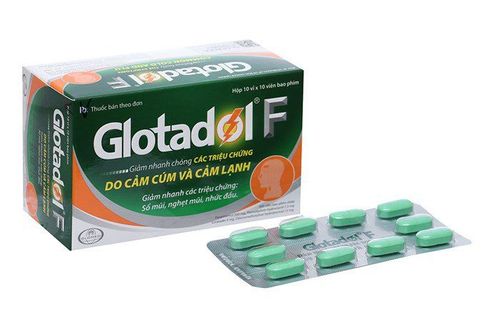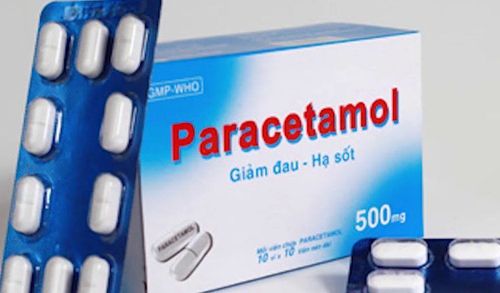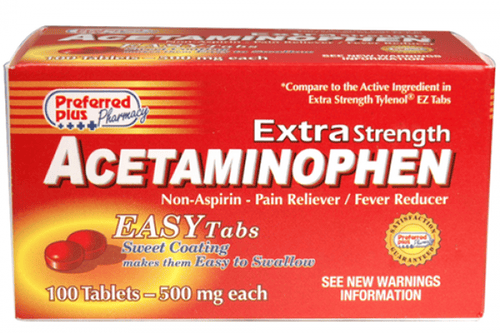This is an automatically translated article.
Acetaminophen and Phenylephrine are available in capsule or tablet form. The main ingredients of the drug include Acetaminophen and Phenylephrine, used to treat disorders of the upper respiratory tract.
1. What are the uses of Acetaminophen and Phenylephrine?
Acetaminophen is a pain reliever and fever reducer. Phenylephrine is a decongestant that constricts the blood vessels in the nose (dilated blood vessels can cause congestion). Acetaminophen and Phenylephrine is a combination medicine, used to: Treat headaches, fever, nasal congestion, sinus congestion caused by allergies, the common cold or the flu. In addition, the drug is also used for other purposes as prescribed by the doctor.
2. How to use and dose of Acetaminophen and Phenylephrine
How to use: Use the medicine exactly as directed by the doctor, do not use it for longer than recommended. Usage for each dosage form is as follows:
Powder form: Dissolve 1 packet of powder with at least 120ml of water, stir the mixture and drink immediately; Effervescent tablet: Drop the effervescent tablet into 1 cup with at least 120ml, wait for the effervescent tablet to dissolve completely and drink immediately. Patients should stop taking the medicine and call their doctor right away if fever persists after 3 days of use or pain occurs after 7 days (5 days in children) or symptoms get worse (skin rash, constant headache, swelling, redness, ...).
Dosage:
For adults with stuffy nose: 325mg Acetaminophen/5mg phenylephrine: 2 tablets every 4 hours; maximum 5 doses/day; 500mg Acetaminophen/5mg phenylephrine: 2 tablets every 6 hours; maximum dose of 4 doses/day; For adults with sinus symptoms: 325mg Acetaminophen/5mg phenylephrine: 2 tablets every 4 hours; maximum 5 doses/day; 500mg Acetaminophen/5mg phenylephrine: 2 tablets every 6 hours; maximum dose of 4 doses/day; For adults with headache: 325mg Acetaminophen/5mg phenylephrine: 2 tablets every 4 hours; maximum 5 doses/day; 500mg Acetaminophen/5mg phenylephrine: 2 tablets every 6 hours; maximum dose of 4 doses/day; For children 12 years and older with nasal congestion: 325mg Acetaminophen/5mg phenylephrine: 2 tablets every 4 hours; maximum 5 doses/day; 500mg Acetaminophen/5mg phenylephrine: 2 tablets every 6 hours; maximum dose of 4 doses/day; For children 12 years and older with sinus symptoms: 325mg Acetaminophen/5mg phenylephrine: 2 tablets every 4 hours; maximum 5 doses/day; 500mg Acetaminophen/5mg phenylephrine: 2 tablets every 6 hours; maximum dose of 4 doses/day; For children 12 years and older with headache: 325mg Acetaminophen/5mg phenylephrine: 2 tablets every 4 hours; maximum 5 doses/day; 500mg Acetaminophen/5mg phenylephrine: 2 tablets every 6 hours; maximum dose of 4 doses/day; Missed doses: Because Acetaminophen and Phenylephrine are taken as needed, the patient may not be on a dosing schedule. If the patient is taking the medication regularly, the patient should take the missed dose as soon as he or she remembers. If it is almost time for your next dose, skip the missed dose.
Overdose: In case of emergency or overdose of Acetaminophen and Phenylephrine, the patient should call 911 and be hospitalized immediately because Acetaminophen overdose can be fatal. The first signs of an Acetaminophen overdose include: Loss of appetite, nausea, vomiting, sweating, stomach pain, confusion, and weakness. Subsequent symptoms may include upper abdominal pain, jaundice, yellow eyes, dark urine,...
3. Acetaminophen and Phenylephrine side effects
Some side effects patients may experience when using Acetaminophen and Phenylephrine include:
Common side effects, not dangerous: Dizziness, weakness, light headache, nausea, abdominal pain, diarrhea , runny nose, feeling anxious, restless, sleep problems (insomnia); Rare, dangerous side effects: Allergic reactions (rash, difficulty breathing, swelling of the face, lips, tongue or throat). In some cases, Acetaminophen can cause serious skin reactions, even death. Stop taking the medicine and call the doctor at once if the patient develops a fast, slow or irregular heartbeat; hallucinations, confusion, tremors, seizures, little or no urination, nausea, upper abdominal pain, itchy skin, loss of appetite, dark urine, yellowing of the skin or eyes, clay-colored stools, high blood pressure dangerous (severe headache, ringing in the ears, blurred vision, anxiety, confusion, shortness of breath, chest pain,...). 4. Caution when taking Acetaminophen and Phenylephrine Before and while taking Acetaminophen and Phenylephrine, patients should note:
Do not use the drug if you are allergic to Acetaminophen or Phenylephrine; Tell your doctor if you have other medical conditions, especially of: Liver disease, cirrhosis, history of alcoholism, high blood pressure, heart disease, coronary artery disease, hyperthyroidism, adrenal tumor, you are taking depression medication; Check with your doctor before using any other cold, allergy, pain reliever or sleeping pill because Acetaminophen is an ingredient in many medicines. The combination can cause a very dangerous Acetaminophen overdose; Avoid alcohol because alcohol increases the risk of liver damage when using Acetaminophen; Do not use Acetaminophen and Phenylephrine if you have taken an MAO inhibitor (including isocarboxazid, rasagiline, linezolid, phenelzine, selegiline, and tranylcypromine) in the past 14 days because of the potential for dangerous drug interactions; Do not take more medicine than recommended by your doctor because an overdose of Acetaminophen can cause liver damage, even death; In rare cases, Acetaminophen can cause serious skin reactions; Pregnant and breastfeeding women should not use Acetaminophen and Phenylephrine without the permission of a doctor; Always consult your doctor before giving this medicine to a child; The drug can cause distraction or affect reflexes, so be careful when driving or doing other things that require alertness. 5. Acetaminophen and Phenylephrine Drug Interactions Some of the most common Acetaminophen and Phenylephrine drug interactions include:
Adderall (amphetamine/dextroamphetamine); Adderall XR (amphetamine/dextroamphetamine); Advair Diskus (fluticasone/salmeterol); Advil Cold and Sinus (ibuprofen/pseudoephedrine); Advil Dual Action (acetaminophen/ibuprofen); Alcohol (found in alcoholic beverages); Aleve (naproxen); Allegra (fexofenadine); Alupent (metaproterenol); Ambien CR (zolpidem); Anoro Ellipta (umeclidinium/vilanterol); Benadryl (diphenhydramine); Effexor XR (venlafaxine); Prevacid (lansoprazole); Sudafed PE Congestion (phenylephrine); Trintellix (vortioxetine); Vitamin C with Rose Hips (ascorbic acid); Vitamin D3 (cholecalciferol); Zantac (ranitidine); Zyrtec (cetirizine). Before and during the use of Acetaminophen and Phenylephrine, if there is any abnormality, the patient should immediately notify the doctor for timely treatment.
Please dial HOTLINE for more information or register for an appointment HERE. Download MyVinmec app to make appointments faster and to manage your bookings easily.













